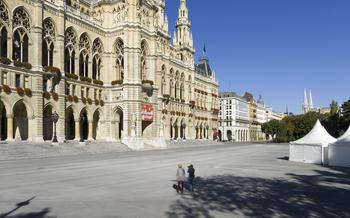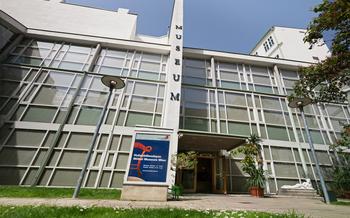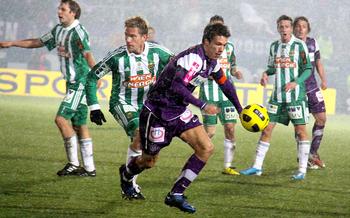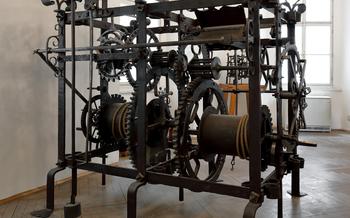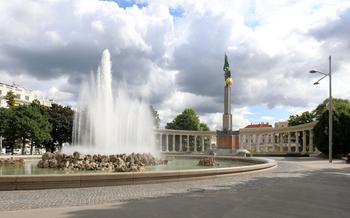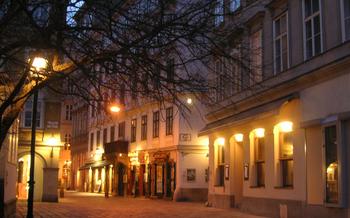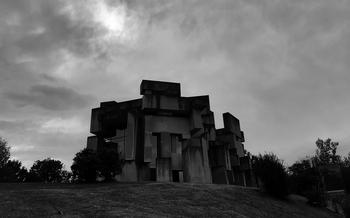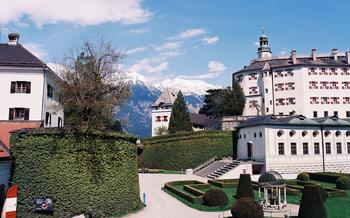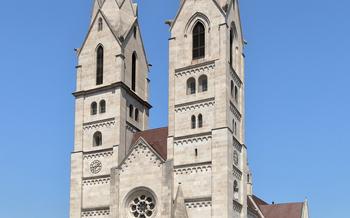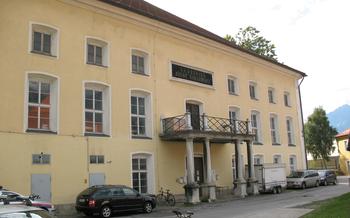
Vienna Observatory
- Vienna Observatory: A Window to the Cosmos
- Exploring the Permanent Exhibition
- Guided Tours and Workshops
- Public Observing Nights
- Exploring the Surroundings
- Virtual Tours and Online Resources
- Accessibility for All
- Family-Friendly Activities
- Research and Education at the Observatory
- Historical Significance
- Unique Souvenirs and Gifts
- Astrophotography Opportunities
- Night Sky Photography Tours
- Stargazing Events and Festivals
- Insider Tip
Vienna Observatory: A Window to the Cosmos
The Vienna Observatory, nestled in the heart of Austria's capital, is a celestial treasure trove that has been unraveling the mysteries of the cosmos for over two centuries. Founded in 1753 by Empress Maria Theresa, the observatory played a pivotal role in advancing astronomy and establishing Austria as a hub of scientific discovery. Renowned astronomers, including Joseph Johann Littrow and Theodor von Oppolzer, graced its halls, contributing to the vast tapestry of astronomical knowledge.
Conveniently located in the 18th district of Vienna, the observatory is easily accessible by public transportation. Visitors are greeted by a stately building adorned with intricate carvings and a majestic dome that houses the observatory's most prized possession – its refracting telescope. This magnificent instrument, crafted by the renowned optician Joseph Fraunhofer, has been meticulously preserved and continues to be used for astronomical observations, offering visitors a glimpse into the wonders of the night sky.
The observatory's facilities include a range of telescopes, each designed for specific celestial observations. From the versatile refracting telescope to the modern computer-controlled telescopes, visitors can witness the marvels of the universe up close, from the shimmering stars and swirling galaxies to the distant planets that dance gracefully in the cosmic ballet.
Exploring the Permanent Exhibition
The Vienna Observatory's permanent exhibition is a treasure trove of astronomical knowledge and artifacts, inviting visitors to delve into the captivating world of space exploration. Highlights include an impressive collection of historical telescopes, intricately crafted models of celestial bodies, and interactive displays that bring astronomy concepts to life. Step into a realm where you can trace the evolution of telescopes, marvel at the precision of antique instruments, and witness the intricate details of planets, stars, and galaxies rendered in stunning three-dimensional models.
Interactive exhibits engage visitors of all ages, making learning about astronomy an immersive and enjoyable experience. Explore the wonders of the universe through hands-on activities that demonstrate the laws of motion, simulate planetary orbits, and allow you to virtually navigate the night sky. Discover the history of astronomy and the pioneers who pushed the boundaries of our understanding of the cosmos. Immerse yourself in the stories of famous astronomers, their groundbreaking discoveries, and the instruments that aided their remarkable achievements.
The permanent exhibition at the Vienna Observatory is a journey through the cosmos, inspiring awe and curiosity in every visitor. It's a place where the wonders of the universe are unveiled, and the mysteries of space become tangible.
Guided Tours and Workshops
Explore the cosmos in a whole new light with guided tours and workshops at the Vienna Observatory. Embark on a celestial journey as knowledgeable guides lead you through the fascinating history of astronomy and the wonders of the night sky. Discover the intricacies of telescope operation, celestial navigation, and the latest astronomical discoveries during these immersive experiences.
Tailored to cater to diverse interests and skill levels, the observatory offers a range of tours and workshops. Join a general tour to gain a comprehensive overview of astronomy and the observatory's facilities. For a more in-depth exploration, opt for a specialized tour focused on specific topics like astrophysics, planetary science, or cosmology.
Hands-on workshops provide an interactive and engaging way to learn about astronomy. Participate in telescope-making workshops to build your telescope or astrophotography workshops to capture stunning images of the night sky. Experienced instructors guide you through each step, ensuring that you leave with a deeper understanding of astronomy and practical skills to continue your celestial explorations.
Advance booking is recommended to secure your spot in these popular tours and workshops. Check the observatory's website or contact them directly for scheduling and pricing information. Let the Vienna Observatory be your gateway to unlocking the mysteries of the universe, transforming your visit into an unforgettable astronomical adventure.
Public Observing Nights
The Vienna Observatory offers public observing nights, providing an opportunity for visitors to peer into the depths of the cosmos with the guidance of experienced astronomers. These events are typically held on clear evenings, with the frequency varying depending on the time of year and weather conditions. Visitors are treated to stunning views of celestial objects such as planets, stars, nebulae, and galaxies.
Types of telescopes used for public viewing include refractors, reflectors, and specialized solar telescopes. These instruments allow visitors to observe the wonders of the night sky in detail, revealing intricate features and colors that are not visible to the naked eye.
To ensure a successful observing night, visitors are advised to dress warmly and bring binoculars or a telescope if they have one. Flashlights with red filters are also recommended to preserve night vision. Advance booking is recommended to secure a spot, especially during popular events like meteor showers or eclipses.
Exploring the Surroundings
The Vienna Observatory is surrounded by a wealth of attractions and activities that complement a visit to this cosmic wonder. Whether you seek tranquility amidst nature or crave cultural enrichment, the surrounding area offers something for every traveler.
-
Parks and Gardens: For those seeking respite from the city's hustle and bustle, the observatory is adjacent to the sprawling Türkenschanzpark, a verdant oasis with sprawling lawns, tranquil ponds, and a variety of walking trails. Alternatively, take a short stroll to the exquisite gardens of the Palais Liechtenstein, where meticulously manicured hedges, colorful flower beds, and ornate fountains create a picturesque backdrop for a leisurely stroll.
-
Hiking Trails: Lace up your hiking boots and embark on one of the many hiking trails that crisscross the surrounding hills. The nearby Wienerwald, a vast forest just a short drive from the city, offers a network of well-marked trails ranging from gentle strolls to challenging climbs, all showcasing the region's stunning natural beauty.
-
Museums and Cultural Attractions: History buffs and art enthusiasts will find much to explore in the vicinity of the observatory. The nearby Wien Museum houses a vast collection of artifacts and exhibits chronicling the city's rich history, while the MAK - Austrian Museum of Applied Arts / Contemporary Art showcases a diverse range of decorative arts, furniture, and contemporary design. For a touch of musical heritage, visit the Beethoven Museum, dedicated to the life and works of the renowned composer who once called Vienna home.
-
Culinary Delights: After a day of celestial exploration, indulge in the culinary delights of the neighborhood. From traditional Viennese cuisine to international flavors, there are options to suit every palate. For a taste of local specialties, try the Gastwirtschaft Wratschko, a cozy tavern serving hearty Viennese dishes in a charming atmosphere. Alternatively, head to the Naschmarkt, a vibrant market offering a diverse array of fresh produce, artisanal cheeses, and international delicacies.
Virtual Tours and Online Resources
For those unable to visit the Vienna Observatory in person, virtual tours and online exhibitions offer a glimpse into its history, facilities, and discoveries. The observatory's website provides immersive virtual tours that allow visitors to explore the grounds, telescopes, and exhibits at their own pace. These virtual experiences include interactive features, such as 360-degree panoramas, detailed descriptions, and historical insights.
In addition to virtual tours, the observatory's website offers a wealth of educational resources for further learning about astronomy. Videos, podcasts, and articles delve into various astronomical topics, from the basics of stargazing to the latest scientific discoveries. These resources are suitable for astronomy enthusiasts of all levels, from beginners to seasoned observers.
To stay updated on the latest news and events, visitors can follow the observatory's social media pages or subscribe to their newsletter. The observatory also offers online astronomy courses and workshops, providing opportunities for enthusiasts to deepen their knowledge and skills in astronomy without leaving their homes.
Accessibility for All
The Vienna Observatory is committed to ensuring that everyone can enjoy and learn from the wonders of astronomy, regardless of their abilities or needs. Accessibility features such as wheelchair ramps, elevators, and audio guides make it easy for visitors with disabilities to navigate the observatory and its exhibits. Sign language interpreters or other accommodations can be arranged for deaf or hard of hearing visitors, and special programs or events are designed specifically for visually impaired or blind visitors.
To ensure a comfortable and enjoyable experience for all visitors, the observatory staff is always happy to assist with any special requests or needs. Whether you have a physical disability, a learning disability, or simply need a little extra support, the Vienna Observatory is here to help you make the most of your visit.
Here are some tips for visitors with specific needs:
- Contact the observatory in advance to discuss your needs and make any necessary arrangements.
- Arrive early to give yourself plenty of time to explore the exhibits and participate in activities.
- Let the staff know if you need assistance with anything, such as operating a telescope or finding your way around the observatory.
- Take advantage of the many accessible features and resources available, such as audio guides, ramps, and elevators.
- Don't hesitate to ask questions or request assistance from the staff, who are always happy to help.
Family-Friendly Activities
The Vienna Observatory offers a range of programs and activities specifically designed to engage and inspire young visitors. Interactive exhibits and games allow children to explore astronomy concepts in a hands-on manner, fostering their curiosity and understanding of the universe. Storytelling sessions and planetarium shows, tailored to different age groups, bring the wonders of the cosmos to life, sparking a sense of awe and wonder in young minds. To ensure a comprehensive and enjoyable experience for families, the observatory provides recommendations for family-friendly restaurants and attractions in the vicinity, making it a perfect destination for a day of learning and exploration.
Research and Education at the Observatory
The Vienna Observatory is not only a popular tourist destination but also a renowned center for scientific research and education. The observatory collaborates with universities, research institutions, and amateur astronomers worldwide to advance the field of astronomy. Students and researchers can get involved in various astronomy projects, such as observing and analyzing celestial objects, conducting research on astrophysics or cosmology, or developing new instruments and technologies. The observatory also offers courses and workshops on astronomy and astrophotography for those interested in learning more about the wonders of the night sky.
Historical Significance
The Vienna Observatory holds a significant place in the annals of science, contributing to the advancement of astronomy and leaving an indelible mark on scientific history. Over the years, it has served as a hub for groundbreaking discoveries and advancements in the field.
One of the observatory's most notable achievements was the discovery of the minor planet Felicitas in 1852 by Hermann Mayer Salomon Goldschmidt. This discovery marked a significant milestone in astronomy, expanding our knowledge of the solar system and contributing to the understanding of the asteroid belt.
The observatory also played a pivotal role in the development of celestial mechanics. In the 19th century, Johann Georg von Soldner, a renowned astronomer and mathematician associated with the observatory, made significant contributions to the field. His work on calculating the orbits of celestial bodies, including comets, laid the foundation for modern celestial mechanics.
In the 20th century, the observatory continued to be a breeding ground for astronomical innovation. Josef Hopmann, a prominent astronomer and director of the observatory, made significant contributions to the study of variable stars. His observations and research on eclipsing binary stars earned him international recognition and helped advance our understanding of these celestial objects.
The Vienna Observatory's historical significance is not limited to its discoveries and advancements. It has also been the workplace of renowned astronomers who have shaped the course of the discipline. Simon von Stampfer, a pioneer in the field of astrophotography, conducted groundbreaking work at the observatory, capturing some of the earliest images of the night sky.
Throughout its history, the Vienna Observatory has been recognized for its invaluable contributions to astronomy. It has received numerous awards and accolades, including the Bruno H. Bürgel Prize in 2007, honoring its outstanding achievements in the field of observational astronomy.
The observatory's historical significance extends beyond its walls, influencing the broader scientific community and inspiring generations of astronomers. It remains a testament to the power of human curiosity and the pursuit of knowledge, continuing to shape our understanding of the cosmos.
Unique Souvenirs and Gifts
The Vienna Observatory offers a unique opportunity to take home a piece of astronomical history and knowledge. Its gift shop or bookstore is a treasure trove of astronomy-themed souvenirs and gifts that cater to every interest and budget. From intricately designed celestial jewelry and space-themed toys for children to books, posters, and educational materials on astronomy and space exploration, there's something for everyone.
One of the most popular souvenirs is the observatory's signature telescope model. These miniature replicas of the observatory's telescopes are handcrafted with precision and attention to detail, making them a beautiful and educational keepsake. Visitors can also find a variety of astronomy-themed books, written by renowned astronomers and scientists, covering topics from the history of astronomy to the latest discoveries in the cosmos.
For those who want to delve deeper into the mysteries of the universe, the gift shop offers a selection of educational materials, including star charts, planetarium kits, and interactive astronomy software. These resources are perfect for students, hobbyists, or anyone who wants to learn more about the wonders of the night sky.
Whether you're looking for a unique gift for a friend or family member, or a special memento of your visit to the Vienna Observatory, the gift shop is sure to have something that will spark your imagination and ignite your passion for the cosmos.
Astrophotography Opportunities
The Vienna Observatory offers a unique opportunity for astrophotography enthusiasts to capture stunning images of the night sky. The observatory's facilities include a dedicated astrophotography platform equipped with state-of-the-art telescopes and cameras. Visitors can book a time slot to use the platform and receive guidance from experienced astrophotographers.
For those new to astrophotography, the observatory offers workshops and classes that cover the basics of equipment, techniques, and image processing. These workshops provide hands-on experience and the chance to learn from experts in the field.
The clear skies and low light pollution around the observatory create ideal conditions for capturing celestial images. Visitors can expect to photograph galaxies, nebulae, star clusters, and planets with remarkable clarity and detail.
The observatory also hosts astrophotography exhibitions showcasing the work of talented astrophotographers from around the world. These exhibitions provide inspiration and an opportunity to learn about the latest techniques and trends in astrophotography.
Whether you are a seasoned astrophotographer or just starting out, the Vienna Observatory offers an exceptional environment to capture the beauty of the night sky and create lasting memories of your visit.
Night Sky Photography Tours
The Vienna Observatory offers guided night sky photography tours and workshops for enthusiasts of all skill levels. These tours provide a unique opportunity to learn from experienced astrophotographers and capture stunning images of the night sky.
During these tours, participants will learn the basics of night sky photography, including camera settings, composition, and focusing techniques. They will also receive guidance on choosing the right equipment for astrophotography, such as cameras, lenses, and tripods.
The tours take place on clear nights, and participants are provided with telescopes and other equipment to help them capture the best possible images. The observatory's location away from city lights ensures dark skies and optimal conditions for astrophotography.
Participants are encouraged to bring their own cameras and lenses, but the observatory can also provide equipment for those who do not have their own. The tours are suitable for both beginners and experienced photographers, and participants are sure to come away with stunning images of the night sky.
Stargazing Events and Festivals
The Vienna Observatory organizes special events and festivals throughout the year to bring the wonders of the night sky to the public. These events offer a unique opportunity for visitors to experience the beauty and mystery of the cosmos under the guidance of experienced astronomers.
One of the most popular events is the annual Stargazing Party, held during the summer months. This event features guided tours of the observatory's facilities, telescope viewing of celestial objects, and interactive activities for all ages. Visitors can learn about the constellations, planets, and galaxies while enjoying the breathtaking views of the night sky.
Another highlight is the Meteor Shower Observation Night, which takes place during the peak of various meteor showers throughout the year. Participants can witness the dazzling display of "shooting stars" as they streak across the sky. The observatory provides telescopes and expert guidance to help visitors identify and understand these celestial phenomena.
In addition, the observatory hosts astronomy workshops and lectures for those interested in delving deeper into the science of astronomy. These events cover topics such as astrophotography, telescope making, and the latest discoveries in the field. Participants can learn from experienced astronomers and ask questions about the universe.
To find out more about upcoming events and festivals, visitors can check the observatory's website or social media pages. Advance registration is recommended for some events to ensure a spot.
Insider Tip
For those seeking a unique and off-the-beaten-path astronomical experience, the Kuffner Observatory is a hidden gem located on the outskirts of Vienna. Founded in 1886, this historic observatory offers visitors a chance to explore the cosmos through its collection of vintage telescopes and participate in guided stargazing sessions.
Another insider tip for astronomy enthusiasts is to connect with local astronomy clubs and organizations. The Wiener Arbeitsgemeinschaft für Astronomie (WAA) is a vibrant community of amateur astronomers who organize regular stargazing events, workshops, and lectures. Joining the WAA is a great way to meet like-minded individuals, learn about astronomy, and get involved in hands-on projects.
To fully immerse yourself in the wonders of the night sky, venture beyond the city lights. The Lainzer Tiergarten, a vast nature reserve just west of Vienna, offers breathtaking views of the Milky Way and distant galaxies. Pack a blanket, binoculars, and a thermos of warm tea, and find a secluded spot to enjoy the celestial show.
Finally, keep an eye out for astronomy-related events and conferences taking place in Vienna throughout the year. The University of Vienna and the Austrian Academy of Sciences often host public lectures, workshops, and exhibitions on various astronomical topics. These events provide an excellent opportunity to learn from experts in the field and engage with fellow astronomy enthusiasts.
